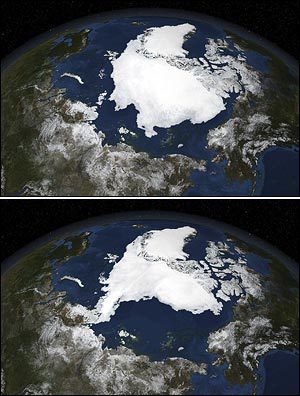The Arctic sea ice extent on Sept. 16 stood at 1.59 million square miles, or 4.13 million square kilometers, as calculated using a five-day running average, according to the team. Compared to the long-term minimum average from 1979 to 2000, the new minimum extent was lower by about 1 million square miles -- an area about the size of Alaska and Texas combined, or 10 United Kingdoms, they reported.

|
| ©telegraph.co.uk |
| Photographs taken in September 2005 and 2007 |
The minimum also breaks the previous minimum set on Sept. 20 and Sept. 21 of 2005 by about 460,000 square miles, an area roughly the size of Texas and California combined, or five United Kingdoms, they found. The sea ice extent is the total area of all Arctic regions where ice covers at least 15 percent of the ocean surface.
Scientists blame the declining Arctic sea ice on rising concentrations of greenhouse gases that have elevated temperatures from 2 degrees F to 7 degrees F across the arctic and strong natural variability in Arctic sea ice, said the researchers.
The CU-Boulder research group said determining the annual minimum sea ice is difficult until the melt season has decisively ended. But the team has recorded five days of little change, and even slight gains in Arctic sea ice extent this September, so reaching a lower minimum for 2007 seems unlikely, they reported.
Arctic sea ice generally reaches its minimum extent in September and its maximum extent in March. The researchers used satellite data from NASA, the National Oceanic and Atmospheric Administration and the U.S. Department of Defense, as well as data from Canadian satellites and weather observatories for the study.
"The amount of ice loss this year absolutely stunned us because it didn't just beat all previous records, it completely shattered them," said CU-Boulder senior scientist Mark Serreze of NSIDC.



Reader Comments
to our Newsletter